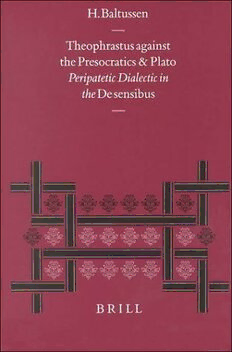
Theophrastus Against the Presocratics and Plato: Peripatetic Dialectic in the 'De Sensibus' PDF
306 Pages·2000·16.284 MB·English
Most books are stored in the elastic cloud where traffic is expensive. For this reason, we have a limit on daily download.
Preview Theophrastus Against the Presocratics and Plato: Peripatetic Dialectic in the 'De Sensibus'
Description:
An interpretation of Theophrastus' "De Sensibus", a treatise unique in content and method, as it reports and criticizes the theories of sense perception of the Presocratics and Plato. Most of the material on the Presocratics is found nowhere else, which explains why many passages can be found scattered over the "Fragmente der Vorsokratiker". As an antidote to this fragmented approach the Presocratics are here studied in context, a text informed by a distinctly Peripatetic perspective. The analysis of the reports and (long-neglected) criticisms of Plato (chapter 4) and the Presocratics (chapter 5) offers insights into Theophrastus' exegetical procedure by using Peripatetic dialectic as a heuristic tool. The Epilogue outlines some implications for the role of the treatise in the doxographical tradition.
See more
The list of books you might like
Most books are stored in the elastic cloud where traffic is expensive. For this reason, we have a limit on daily download.
